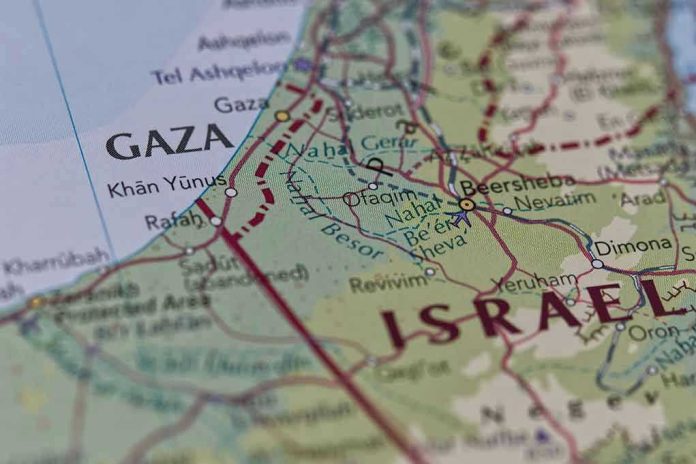
The Israeli army claims it has finally “created the conditions” for a Gaza hostage deal, but as the world waits for a breakthrough, the cost in human lives and liberties keeps piling up—making one wonder if the so-called progress is just another chapter in a never-ending tragedy driven by weak leadership, international handwringing, and a complete disregard for the basics of national security.
At a Glance
- Israeli military says its operations in Rafah have weakened Hamas enough to advance hostage negotiations.
- More than a million Palestinians are displaced and facing a catastrophic humanitarian crisis as fighting intensifies.
- Hostage talks remain stalled, with international mediators struggling to broker a deal amid continued violence.
- The assault on Rafah has led to the closure of key hospitals and repeated civilian casualties.
Israel Pushes Hard in Rafah, Claims Progress on Hostages
Israeli Defense Forces (IDF) leadership announced that after months of relentless military operations in Gaza’s southernmost city, Rafah, they have “created the conditions” for a potential breakthrough in hostage negotiations. This statement comes after a brutal campaign that has left over a million Palestinians trapped in a shrinking sliver of land, with basic infrastructure in ruins and humanitarian aid barely trickling through. The military claims that the damage inflicted on Hamas’s command structure has finally put enough leverage on the table to force the militants into a deal. Yet for many observers, this so-called leverage comes at a staggering cost, with Palestinian civilians paying the highest price as bombs fall and medical facilities shutter their doors.
Israel’s government, under mounting domestic pressure to secure the release of hostages taken during the October 2023 Hamas attack, has directed the IDF to continue its push—targeting militants along the Philadelphi Corridor near Egypt and conducting airstrikes that have repeatedly hit civilian areas. The strike that closed the Kuwaiti Hospital and another that damaged the Indonesian Field Hospital highlight the ongoing risk to noncombatants. Officials insist that these tactics are necessary to break Hamas’s grip and bring hostages home, but critics argue that the strategy risks undermining any hope for long-term security or stability in the region. The situation on the ground is now so dire that international groups warn of imminent catastrophe, with the United Nations and others calling for an immediate ceasefire to prevent further loss of life.
Hostage Negotiations Mired in Stalemate
Despite the IDF’s optimistic tone, genuine progress on the hostage front remains elusive. Negotiations continue indirectly, with Egypt and Qatar attempting to mediate between Israel and Hamas. Each side accuses the other of stalling, and every new round of violence only complicates the already fraught process. Israeli officials tout military pressure as their best hope for forcing a deal, but humanitarian agencies counter that escalating the assault puts both hostages and innocent civilians at even greater risk. The European Union has floated the idea of reviving its border assistance mission at Rafah, but without agreement from the key parties, this too remains in limbo.
For the families of hostages and the wider Israeli public, frustration and anger are mounting. After nearly two years of war, the constant cycle of attack-and-retaliation has achieved little beyond deepening the suffering on both sides, and faith in the government’s ability to deliver a safe outcome is wearing thin. Meanwhile, the Palestinian population in Rafah and across Gaza faces the grim reality of displacement, deprivation, and the ever-present threat of violence. With every hospital closure and every destroyed home, the humanitarian crisis grows, and the prospect of a durable peace slips even further away.
International Outcry and the Enduring Cost of War
As Israel presses its campaign and touts the supposed gains made against Hamas, international response has grown increasingly critical. Human rights organizations, including Amnesty International, have accused Israel of carrying out unlawful attacks on civilians and warned of the risk of war crimes and even genocide. The United Nations and other groups highlight the catastrophic consequences for the civilian population, arguing that military pressure cannot justify the scale of destruction witnessed in Rafah and elsewhere in Gaza.
The long-term consequences of the current offensive are likely to haunt both sides for years to come. Gaza faces economic ruin, social fragmentation, and a shattered infrastructure. Israel, for its part, must grapple with the political fallout, deepening divisions at home, and ongoing scrutiny from the international community. For the broader region, every day that the fighting drags on raises the risk of a wider conflict—one that could draw in neighboring states and spark a new wave of instability. Yet, as the powers-that-be keep playing geopolitical chess, it’s the families of hostages, the displaced, and the dispossessed who are left to pick up the pieces, wondering if anyone in authority actually remembers what the words “security” and “humanitarian values” once meant.
Sources:
Israel offensive in southern Gaza leaves civilians in “catastrophic” conditions – CBS News



